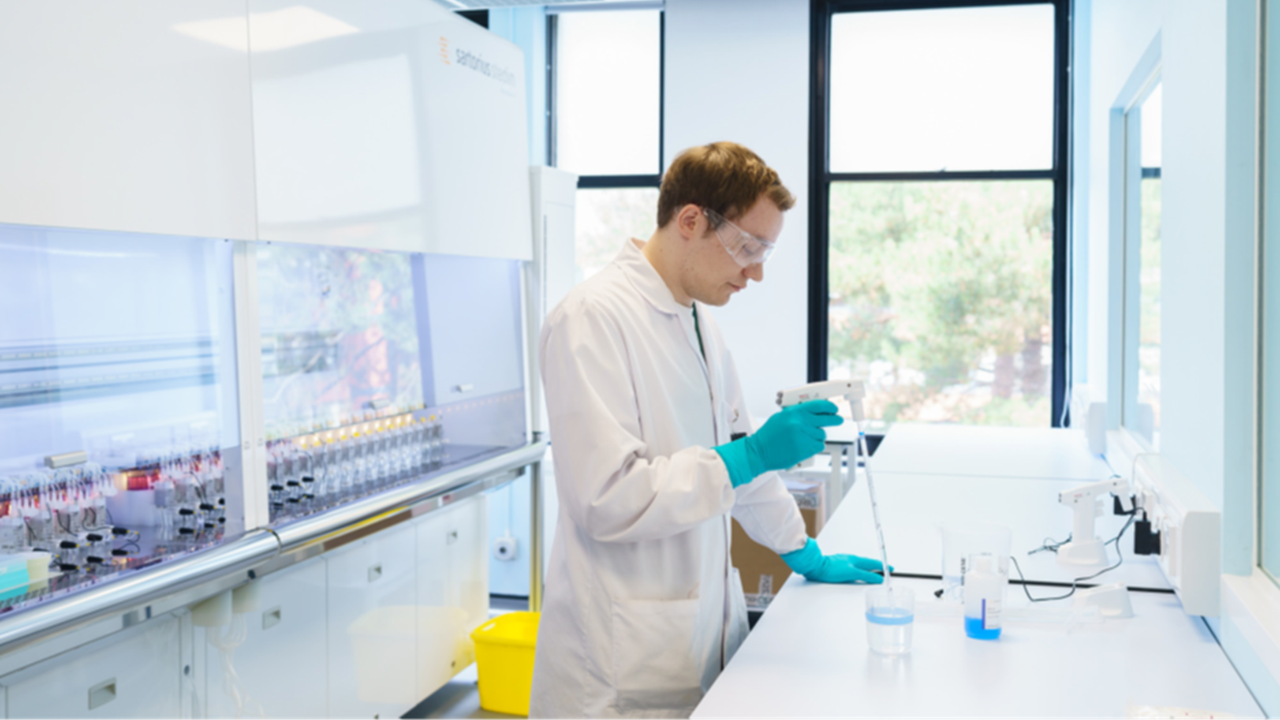Over 3 million people around the world die each year from vaccine-preventable diseases. While a small fraction of these deaths occur in those who have voluntarily abstained from being vaccinated, the vast majority are the result of access issues to these life-saving vaccines.
Vaccines and other biopharmaceuticals that are traditionally produced in cell systems require a complex cold chain to maintain product integrity, as they’re shipped on a global scale. Not only does this centralized biopharmaceutical manufacturing system require complex equipment and highly-skilled staff, thereby increasing costs, but the cold chain requirements make it next-to-impossible to deliver the drugs to remote and developing regions.
To counteract these access issues, Dr. James J. Collins, Professor in the Department of Biological Engineering at MIT and his colleagues, have developed a freeze-dried, cell-free biomolecular expression system. Highly portable, this technology utilizes all of the transcription and translation machinery – including DNA, RNA, enzymes and ribosomes – found in cells, and applies them to generate biomolecules in a cell-free environment.
“We’ve shown that you can take cell-free extracts and freeze-dry these in the form of pellets,” said Collins in an interview with Xtalks. “These can then be stored and distributed at room temperature out past a year, and sometime later you simply add water, and they’ll begin to function as if they’re effectively inside a living cell.
“We further show that you can create engineered DNA molecules that are coded to produce a molecule of interest that then can be freeze-dried, and eventually added to the cell-free pellets. If water is added with both components present, that encoded DNA will then be effectively ‘turned on’ and enabled to make the molecule of interest from its DNA.”
Collins’ technology represents a big step forward in using synthetic biology to manipulate cellular components and produce the biomolecules we need, when and where they’re required. This system could be applied in the on-demand synthesis of vaccines, antimicrobial agents and diagnostic molecules in remote or impoverished areas of the world. Collins goes on to say that the pellets could be carried by military personnel, athletes and even astronauts.
But the freeze-dried, cell-free system inevitably brings up questions surrounding the efficacy of the resulting biopharmaceutical products, as compared to their traditionally-produced batch-manufactured counterparts. How do the enzymes necessary for DNA expression and protein synthesis maintain their activity outside the cell system?
“They are effectively biochemical reactions and so provided the molecules of interest are present in a small enough area which allows them to interact appropriately, it turns out that it’s feasible for them to perform the reactions of relevance,” said Collins. “Our work has shown that the freeze-drying process now enables easy portability, and that there is little – if any – loss of activity as a result of the freeze drying process.”
Biopharmaceutical companies face strict regulations when it comes to product quality. Regardless of the drug delivery method – including topical, oral and injectable products – all biopharmaceuticals need to have a high level of biological activity.
In the case of injectable drugs, manufacturers must take extra precautions to assure that the product meets purity and sterility standards. Since biopharmaceuticals synthesized using the researchers’ portable platform are produced in a cell-free environment, Collins and his team say many drugs could be used without any further purification steps, making it an ideal technology for resource-poor environments.
“We developed antimicrobial peptides that can be used to treat infection,” said Collins. “Using bacterial cultures to test the freeze-dried product, we found it actually had the appropriate biological activity.”
In terms of the amount of training someone needs to be able to apply this platform in the field, Collins says it’s very little. “In many cases, it’s simply a matter of adding water, and in the most complex cases, applying a filtering step if you’re going to inject something after the process. But we’re not requiring them to have any knowledge of freeze-drying or DNA coding – that would be done off-site.”
While this user-friendly drug manufacturing technology appears to challenge the status quo when it comes to the centralized production and cold chain distribution of biologics, Collins says Big Pharma has no reason to fear. Their portable technology applies to an underserved sector of the market which may otherwise not have access to vaccines and other drugs which require refrigeration.
Despite its benefits, the freeze-dried, cell-free technology may not be applicable to the production of all biopharmaceuticals. In particular, complex therapeutic proteins involving post-translational modification, such as phosphorylation and glycosylation, could prove too difficult to synthesize in a simple cell-free system.
Collins and colleagues’ article – published in the prestigious journal, Cell – was a proof of concept study, meaning that the freeze-dried DNA expression machinery has yet to be applied in the field. In addition to investigating the platform’s cost-effectiveness and scalability, Collins says the work – which was largely done at Harvard’s Wyss Institute – could be further developed in a spinout company, which has yet to be established.
“Within the Wyss Institute, we are also exploring how you could harness it for more direct practical applications, including using it as the basis for a smart bandage,” said Collins. “The bandage could have the cell-free components embedded in it, and could produce proteins that might speed wound healing.
“Secondly, this smart bandage could produce diagnostic molecules that would report on the state of the wound to indicate if it’s infected, and/or if there’s a resistant infection. Maybe it could even go the next step and produce molecules in response to that detection, which could treat such an infection.”
Do you think this on-demand biopharmaceutical manufacturing platform will help improve access to life-saving medications around the world? Share your thoughts in the comments section below!










Join or login to leave a comment
JOIN LOGIN